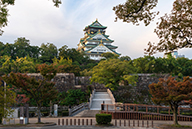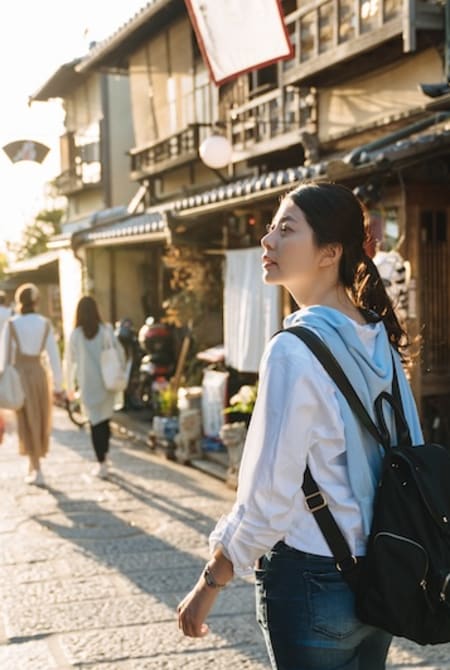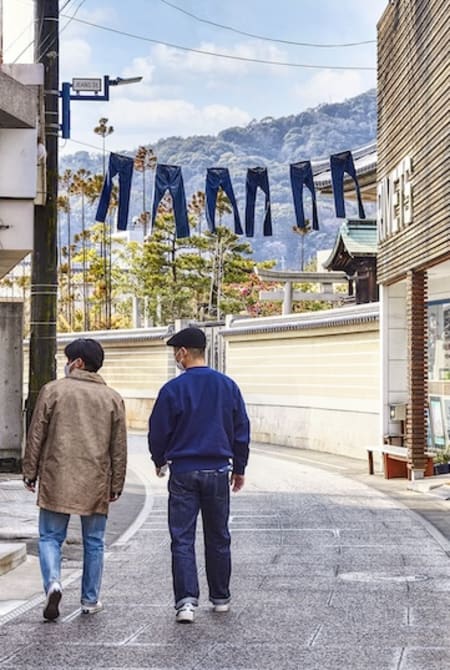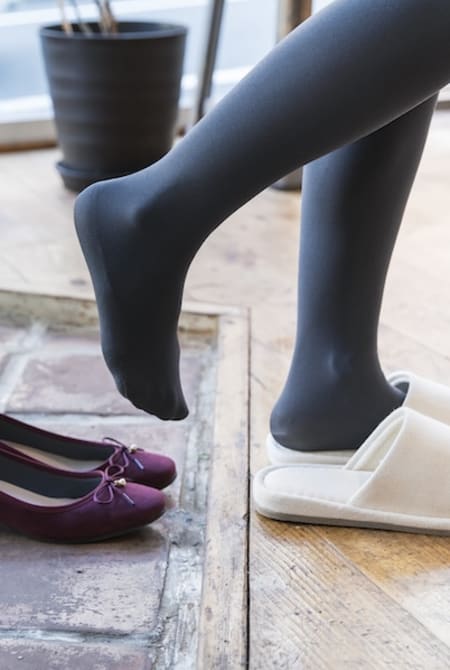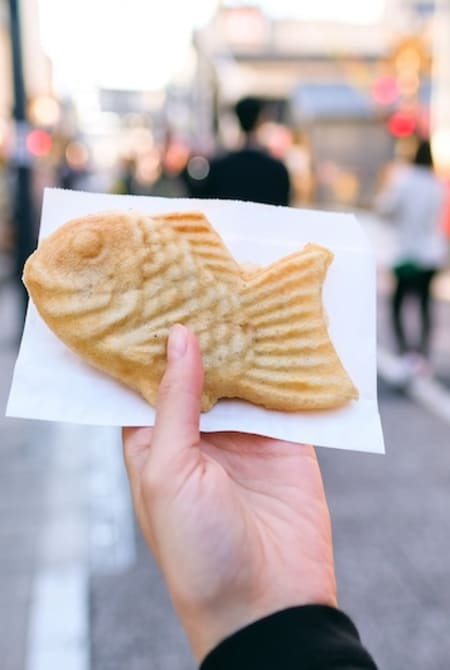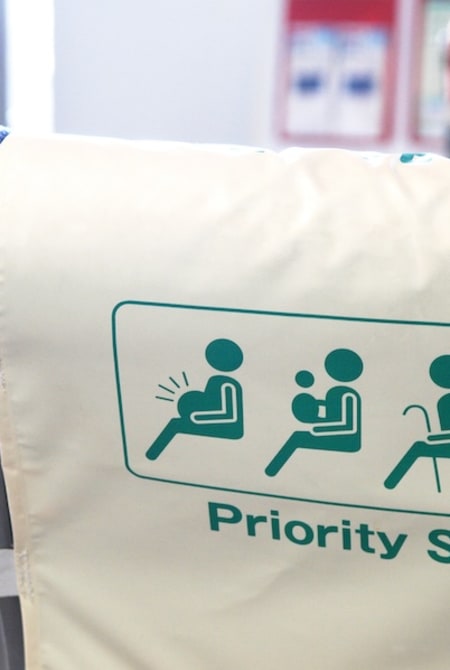Use the
Planning a Trip to Japan?
Share your travel photos with us by hashtagging your images with #visitjapanjp
Enrich your Japan journey by embracing the country’s social customs
Know more, worry less, and travel farther. Understanding and respecting the cultural etiquette of Japan will enrich your experience and give you the confidence to explore beyond the usual tourist paths. It starts with knowing how to greet the people you meet, when to take off your shoes, and what behavior is appropriate on public transportation.
The Basics
Get to know some basic customs and enjoy smoother, more meaningful interactions with the people you meet.
-
Konnichiwa!
While English is spoken in many hotels, shops, and restaurants, especially in major cities, speaking a word or two in Japanese is always appreciated. Learning a few key phrases like greetings and how to say “please” and “thank you,” can make a big difference.
View useful expressions
-
Consideration and mindfulness
Much of Japanese etiquette centers on not inconveniencing others. Be aware of your surroundings and mindful of how your actions might impact those around you. When in doubt, observe what others are doing, or ask for guidance.
Read more about traveling mindfully
-
Keeping things clean
It is an important part of Japanese culture to respect the environment and your surroundings, by not littering, cleaning up after yourself, and taking trash home with you if garbage cans are not available. Whether in cities or remote areas, dispose of your waste responsibly.
Read more about public behavior and disposing of trash
-
Getting in line
People line up for everything in Japan—trains, checkouts, restaurants, store openings, and more. No matter how long, the lines are orderly, and no one cuts ahead. Join in this national pastime and stand in line, following the signs or floor markers if there are any.
Read about travel etiquette and traveling comfortably
-
Punctuality
Every day, millions depend on the punctuality of public services in Japan, reflecting a culture that values being on time and respecting others’ schedules. This commitment to punctuality extends to reservations, so be sure to call ahead or notify the establishment if you are running late.
Discover tips for making and managing reservations
-
Wearing masks
Wearing masks in public is common in Japan, for reasons ranging from allergies to hiding a pimple. Most often though, masks are worn to prevent spreading germs and viruses when someone is sick. If you are experiencing symptoms such as coughing or sneezing, it is courteous to wear a mask.
Learn what to do when feeling ill
-
Taking off shoes
At some attractions, restaurants, and traditional hotels, you will be asked to take off your shoes before entering. Usually, there are shoe racks for storing your shoes, and you may be given slippers to wear instead. Look for signs and observe what others are doing around you.
Read more about Japanese manners
-
Hot spring bathing
Soaking in Japan’s hot springs is a must for many travelers, but there are a few things to know, such as washing thoroughly and rinsing off any soap before entering the water, or not wearing any clothing or swimwear in the baths.
Read more about bathing etiquette
Restaurants and Dining
Japanese food is renowned worldwide and is often a major draw for visitors. To get the most out of your culinary journey, keep these basic manners in mind.
-
Reservations and cancellations
If you make a reservation, be sure to show up on time or cancel well in advance if you’re unable to make it. In some smaller restaurants, ingredients are bought and prepared fresh based on reservations. If you fail to cancel in time, it could mean wasted food.
Discover tips for making and managing reservations
-
Table charges
Some restaurants have table charges, which are usually made clear on menus and signs. Especially at izakaya, (gastropubs), a small appetizer is often served automatically. This is not complimentary and is considered a table charge. If you are unsure whether a restaurant has a cover fee, check with the waitstaff.
Learn more about dining at izakaya
-
Wet towels
A small towel called an “oshibori” is often provided at restaurants. This is to wipe your hands before eating. It might be tempting to wipe your face with it, especially on a hot day, but this is considered bad manners. After using the towel, fold and place it to the side or back on the tray if one is provided.
Learn more about Japanese food etiquette
-
Chopsticks
Japanese food is mainly eaten with chopsticks, but most restaurants will provide cutlery if you ask. Like any utensil, there are manners to follow, such as how to use chopstick rests or communal chopsticks.
Read more about chopsticks and dining etiquette
-
Ordering as you eat
When dining at izakaya or more casual restaurants in a group, dishes are shared, and more are typically ordered as the night goes on. Just make sure to coordinate the orders so you don’t end up over-ordering or crowding the table with too many dishes at once.
Discover mottainai, Japan’s culture of mindful consumption and reducing waste
-
Wearing fragrances
In some dining experiences, like at sushi restaurants, the focus is on delicate flavors and subtle aromas. To fully enjoy the meal—and to avoid impacting others’ enjoyment—try not to wear strong fragrances. Occasionally, restaurants may have rules on wearing perfumes.
Read about the delicate flavors of Japanese cuisine
-
Tipping
Tipping is not customary in Japan and will often be met with confusion. Show your appreciation with an “arigato gozaimashita!” (thank you) and a smile instead.
Read more about tipping
Shopping
Japan is a shopper’s paradise with so much to buy from niche souvenirs and local crafts to designer brands and the latest electronics. Here are some points to consider for your next shopping spree.
-
Shopping bags
In a drive to reduce waste, most shops charge for plastic bags, some also for paper bags. Bring a foldable tote bag to avoid the extra fees and do your part for the environment. Many shops sell tote bags with fun, local designs that you can use in your day-to-day and as a memento for your travels.
Discover mottainai, Japan’s culture of mindful consumption and reducing waste
-
Food and drink
When entering any store, don’t bring in any food or drink from outside. You don’t want to accidentally spill it, or have it mistaken for food and drink from the store. Also, wait till you’ve left the store to open or consume anything you have bought there.
View the Japan Shopping Guide
-
Trying things on
If you see something you want to try on, ask the staff, and they’ll direct you to the nearest changing rooms. Sometimes you’ll be asked to remove your shoes before stepping into the fitting room, to avoid dirtying the floor.
View shopping FAQs
-
At the cash register
With various payment options in Japan, it’s best to check accepted methods before entering a store. Some may be cashless, others accept only specific cards, while some small shops and cafes are cash-only.
Learn about cashless payment in Japan
Public Transportation
The public transportation in Japan, especially in the major cities, is clean, comfortable, and efficient despite the millions of people who use it daily. Bear in mind the following to help keep it punctual and comfortable for everyone.
-
Keep conversations quiet
In Japan consideration for others extends to not disturbing other people on public transportation. Everyone does their best to keep their voices down and refrain from talking on their phone. If you want to listen to music or watch a movie, use headphones.
Learn more about traveling mindfully
-
Give up your seat
Give up your seat to those who need it more, such as the elderly, expectant mothers, parents with young children, or people with disabilities. They may decline, but it’s a small gesture that can make a big difference.
Learn more about travel etiquette and getting around comfortably
-
Carry cash
It’s generally advisable to always carry cash in Japan, especially when traveling outside of the major cities. Some buses and taxis in rural areas only take cash, but even in downtown areas, not all train ticket machines take cards, or there may be issues with different card companies.
Find out about currency and currency exchange
-
Don't walk on escalators
Walking on escalators can lead to accidents, so stand still and don’t rush. At busy times, stand in two lines if the escalator is wide enough. Be extra careful if you have luggage and make sure you have a firm grip, or just use the elevator.
Learn more about travel etiquette and getting around comfortably
-
Large luggage
Traveling with large luggage can be tricky. If you need to move around with your bags, be sure to stow them out of the way of fellow commuters. On some shinkansen (bullet trains), you may need to reserve storage space for larger luggage.
Learn more about traveling with large luggage

















































